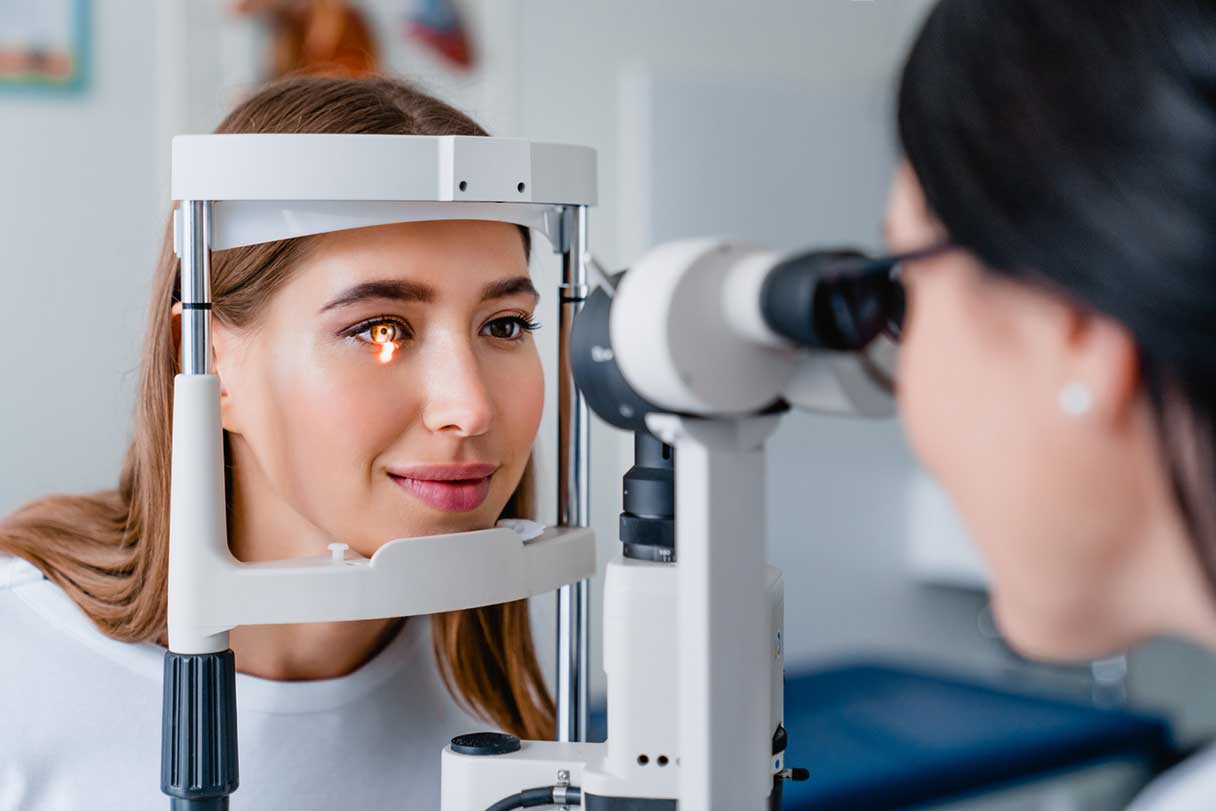Regular eye exams are critical to maintaining good vision and overall eye health. However, not all eye exams are the same, and certain tests and procedures are designed for specific needs. There are differences between a vision screening, a routine eye exam and a comprehensive eye exam.
We’ll examine common types of eye exams and explain their purpose, including what you can expect from each one and how much they cost. Whether you're due for a routine checkup or have specific concerns, understanding the different types of eye exams will give you a clear vision of how to best maintain your eye health.
Types of Eye Exams
Even if your eyes are healthy and your vision is good, regular eye exams are useful in establishing a baseline so potential changes in your vision or eye health can be caught early. Visit an eye doctor sooner if you experience eye pain; eye fatigue; distorted, blurred or double vision; light sensitivity; problems focusing; trouble with night vision; eye flashes; seeing halos or floaters; dry or itchy eyes; or frequent headaches.1
Routine eye exams
During an annual routine eye exam, your eye doctor will check your vision for refractive eye problems such as myopia (nearsightedness), hyperopia (farsightedness), astigmatism or presbyopia. A routine eye exam will also test your current eyeglass or contact lens prescription if you have one to see if your vision has changed over time.1
Comprehensive eye exams
Where a routine eye exam is a basic check for general vision problems, a comprehensive eye exam is an in-depth examination that looks for more extensive problems and signs of disease.2
Comprehensive eye exams are an important component of your overall health and preventive care since many serious eye disorders — some without obvious symptoms — can be detected for early treatment, including:1
- Cataracts
- Diabetic eye problems
- Glaucoma
- Macular degeneration
- Retinal disorders
Early detection and treatment can help prevent irreversible vision loss from some common eye disorders, preserving your vision and quality of life.1
Your eye doctor may suggest other supplemental testing or specialized imaging techniques to get more information on the health of your eyes. Ask your doctor to explain what to expect with each test, the data each test provides and why it’s important.
Vision screenings
A vision screening, or eye test, essentially tests how well you can see things up close or far away using an eye chart. For infants and toddlers, a healthcare provider is also assessing if the child’s eye muscles are working properly and for signs of common early childhood conditions such as amblyopia (lazy eye) or strabismus (cross-eyes).3
Infants and young children typically have vision screenings as part of their routine checkups, and school-aged children may have vision screenings at school. Some adults may have a vision screening as part of their routine checkup with their primary healthcare provider.3
If a vision screening indicates a potential vision problem or eye disorder, you or your child will be referred to an eye-care specialist such as an ophthalmologist or optometrist.3
Average Cost for an Eye Exam
The national average cost* of an annual routine eye exam in the United States for patients with vision insurance is $25 but can range from $20 to $49.4
For patients without a vision insurance plan, the average cost* of an annual routine eye exam in the U.S. is $136 but can range from $105 to $257.4
Costs can vary based on the testing performed during the eye exam, geographic location and the experience and training of the eye doctor.4
Average annual eye exam cost by state/district
Here’s a look at the average costs* of an annual eye exam, with and without insurance, across all 50 states and the District of Columbia.4
| State/District | Average cost (with insurance) | Average cost (without insurance) |
|---|---|---|
| Alabama | $22 | $113 |
| Alaska | $31 | $165 |
| Arizona | $26 | $136 |
| Arkansas | $22 | $116 |
| California | $31 | $166 |
| Colorado | $25 | $137 |
| Connecticut | $25 | $143 |
| Delaware | $25 | $135 |
| District of Columbia | $36 | $174 |
| Florida | $25 | $136 |
| Georgia | $23 | $124 |
| Hawaii | $38 | $196 |
| Idaho | $26 | $139 |
| Illinois | $24 | $126 |
| Indiana | $22 | $121 |
| Iowa | $22 | $119 |
| Kansas | $22 | $118 |
| Kentucky | $24 | $123 |
| Louisiana | $23 | $127 |
| Maine | $26 | $140 |
| Maryland | $29 | $159 |
| Massachusetts | $28 | $164 |
| Michigan | $23 | $124 |
| Minnesota | $23 | $129 |
| Mississippi | $23 | $120 |
| Missouri | $22 | $119 |
| Montana | $25 | $135 |
| Nebraska | $23 | $122 |
| Nevada | $25 | $137 |
| New Hampshire | $26 | $143 |
| New Jersey | $28 | $153 |
| New Mexico | $23 | $123 |
| New York | $26 | $142 |
| North Carolina | $23 | $126 |
| North Dakota | $23 | $124 |
| Ohio | $23 | $122 |
| Oklahoma | $22 | $117 |
| Oregon | $27 | $147 |
| Pennsylvania | $24 | $131 |
| Rhode Island | $27 | $139 |
| South Carolina | $23 | $126 |
| South Dakota | $23 | $125 |
| Tennessee | $23 | $123 |
| Texas | $23 | $126 |
| Utah | $24 | $136 |
| Vermont | $26 | $146 |
| Virginia | $25 | $132 |
| Washington | $27 | $155 |
| West Virginia | $22 | $125 |
| Wisconsin | $24 | $127 |
| Wyoming | $23 | $130 |
Does Insurance Cover Eye Exams?
Vision insurance plans differ from medical health insurance and are usually purchased separately. Most vision plans include benefits such as vision exams, eyeglass frames, eyeglass lenses and contact lenses. Individual vision plans vary and may cover vision exams annually or every other year. Some vision plans offer eyeglass frames and lenses or contact lenses at a discount.5
Medical health insurance can typically be used if you’re being treated for an eye problem or disease or for a medical condition that could cause an eye problem. For example, medical insurance may cover the cost of treatment for glaucoma, floaters, dry eye, allergies, infections, cataracts or monitoring the development of cataracts. Coverage may also extend to patients with diabetes or those using medication that may cause eye-related side effects.5
Every vision plan and health insurance plan is different. Contact your insurance provider for a complete overview of what may or may not be covered under your plan.
How Often Should You Have Your Eyes Checked?
Regular eye exams can detect potential vision issues before they become problematic. Knowing how often to have your eyes checked protects your overall eye health at any age.
Children
Children, from birth through teenage years, should receive vision screenings as part of their routine wellness checks to determine if a more comprehensive eye exam is necessary. The American Academy of Ophthalmology recommends eye screenings for newborns, at 6 to 12 months, 12 to 36 months, 3 to 5 years old and at 5 years old. These screenings may be conducted by a pediatrician, family physician, eye doctor or other trained healthcare provider.6
Adults
If you're an adult with good vision and overall health, you should get a routine eye exam at least once in your 20s and twice in your 30s, unless your eye doctor recommends otherwise. At age 40 most adults should have a comprehensive eye exam to establish a vision baseline, as this is when early signs of disease and changes in vision often begin to occur.1
Seniors
Seniors aged 65 or older should have eye exams every one to two years to assess for age-related diseases such as cataracts, macular degeneration, glaucoma or diabetic retinopathy.1
Exceptions include:1
- If you have an infection or eye injury or suddenly experience pain, floaters, light flashes or patterns or sudden changes in vision
- If you wear contact lenses or glasses
- If you have a family history of diabetes, high blood pressure or eye disease
Your eye doctor will recommend how often your eyes should be examined if any of the above applies to you.1
Regardless of age, it’s important to adhere to the schedule of checkups your eye doctor has recommended for you based on your needs and current eye health.
Financing Eye Exams With the CareCredit Credit Card
Regular eye exams are an important part of your eye health. Whether you’re getting an eye exam or paying for eye surgery, the CareCredit credit card can help you pay for care where your insurance leaves off.** Use our Acceptance Locator to find a vision specialist near you that accepts CareCredit. Continue your wellness journey by downloading the CareCredit Mobile App to manage your account, find a provider on the go and easily access the Well U blog for more great articles, podcasts and videos.
In addition to vision care, you can also use your CareCredit credit card for dentistry, cosmetic, pet care, hearing, health systems, dermatology, pharmacy purchases, spa treatments and so much more within the CareCredit network. How will you invest in your health and wellness next?
Author Bio
Anne-Marie Kennedy is a freelance writer with more than 20 years of experience covering health and wellness, personal finance and real estate/investing.








